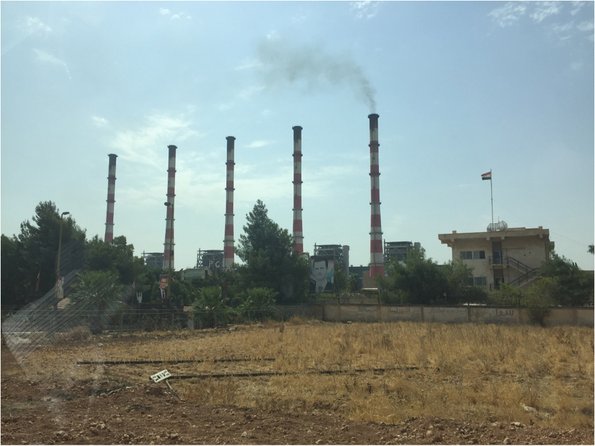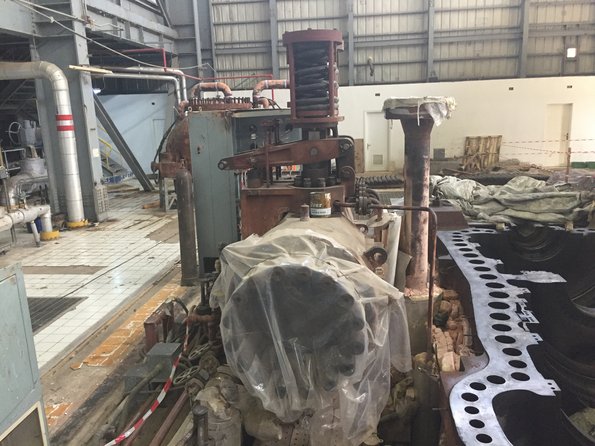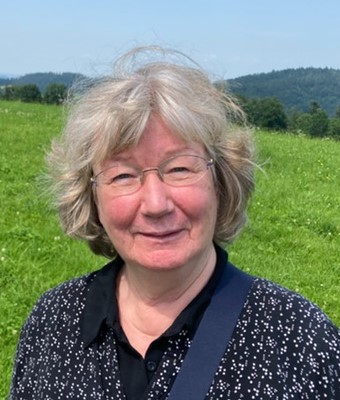When, Europe, I think of thee at night …
by Karin Leukefeld, Damascus/Bonn*
Thank you for inviting me to speak here.
I’m reporting from Syria, from another world.
A few hours ago, I returned from a trip lasting several days through the provinces of Hama, Idlib and Aleppo and would like to briefly report on them.
Morek
In Morek, a small town in the province of Idlib, I was informed about the status of this year’s pistachio harvest. Morek is the centre of the cultivation of “Fistiq Halabi”, the Aleppo pistachios.
There is a lack of rain, the costs of cultivation have risen massively because of the sanctions. Fertiliser cannot be imported because it could also be used to make explosives and because Syria does not have the foreign currency it needs to buy on the world market. Transport is expensive because there is hardly any diesel. Syria’s national oil resources in the north-east are occupied by US troops, who are now bringing oil from the country to Iraq in convoys almost every day. They steal the oil that belongs to Syria, they plunder Syrian resources. The loss was recently put at $107.1 billion by the Syrian Foreign Ministry.
Sanctions, occupation, and the US Caesar Act have created a ring of bans around Syria that is choking the country. The result is the lack of important resources. Scarcity drives up prices and encourages corruption. The people pay the price. They work at two or more jobs and still barely manage to feed themselves and their families.
Inflation and rising prices make life so expensive that people can no longer afford it.
You may remember that during one of my lectures I showed pictures of the pistachio farmers I first met two years ago, in September 2020. They cried when they presented me with their first harvest after eight years of war.
Two brothers, Jasser Kazem and his younger brother Mohammad gave me an appeal to take with me. They wanted to say something to people in Europe and especially in Germany:
“Please do something to lift European sanctions against Syria. This punishment hurts the people, not the government. All Syrians must suffer. We want to live and work, rebuild our homes. Help get the sanctions lifted.”
As Mohammad Kazem spoke, his brother Jasser fell silent and put his head in his hands. When he looked up again, he had tears in his eyes.
In their distress, these people – like so many of my interlocutors over the past 11 years in Syria – turned to “the people of Europe and Germany in particular”. Nothing has happened. Germany and Europe are not prepared to lift the unilateral economic coercive measures, as the sanctions against Syria are officially called.
On the contrary. At the so-called “EU donor conference in mid-May 2022” entitled “Support the future of Syria and the region”, the EU foreign policy chief Josep Borrell said that one should “not forget Syria”. But before that, Borrell had repeatedly made it clear that the EU would stick to its “three No’s” on Syria until a “political solution in accordance with UN Security Council Resolution 2254 was firmly underway”. The “three No’s” mean: no resumption of relations with Syria, no aid for reconstruction and no lifting of sanctions.
This is a slap in the face to the pistachio farmers and to all Syrians who want to rebuild their country and cannot because the EU and the USA are preventing this with their “unilateral economic sanctions”.
Aleppo
Yesterday, east of Aleppo, I visited Syria’s largest power station, which was occupied by Islamic State fighters from October 2015 to February 2016. Tank farms were burned down, turbines and control centres were destroyed.
The plant was built in 1994 and went into operation in 1997. During the interview, the manager of the plant estimated the cost of the destruction at 123,450,000 euros. For six years, the power plant could not be repaired and put back into operation because almost everything that was needed in terms of spare parts had to be brought from abroad. This was and will continue to be prevented by EU and US sanctions.
“No one helped us,” said the manager. No state, no government, no international aid organisation.
Nevertheless, it has now been possible to put one of the five turbines back into operation. The manager of the facility showed me the destruction and how the repairs are being made. “Friends” would help with the repairs; the spare parts had travelled through many countries until they somehow circumvented the sanctions and arrived in Syria.
I was able to speak to some of the technicians responsible for controlling and monitoring the restored fifth turbine. “We all belong to the first generation of this facility,” said the manager. The power station was built in 1994 and went into operation in 1997. Some had gotten grey hair in almost 30 years, some had no hair at all, he said and everyone laughed.
“We are so proud to be able to work here again and help bring power to the people,” said one of the technicians. Everyone was sparkling, and jasmine blossoms lay on one of the workstations.
“We are not down on the Germans or the people of Europe,” said the manager in parting. “But we see that the governments there are doing everything to harm us.”
The evening
I have been a correspondent in this region for more than 20 years.
It often gets late. Especially in the hot season with up to 45 degrees, you only meet people in the evening or at night. On Wednesday evening I was in Aleppo talking to an independent politician, member of the Aleppo City Council, when suddenly there were two loud cracks in a row and the house shook slightly.
I automatically looked at the clock and thought, an attack? It was 8 a.m. and the conversation continued. A little later we learned that the Israeli Air Force had attacked Aleppo airport. Shortly thereafter, rockets also hit Damascus airport, according to Syrian news. It’s a side note in the European media. In the UN Security Council, Israel’s ongoing, unprovoked attacks on Syria are not worth discussing.
Syria seems forgotten in the official media and in politics. This becomes particularly clear to me in the evenings and at night when I reflect on my daily work. Reading my notes, listening to my recordings, looking at the photos I’ve taken during daytime conversations.
Sorting. This also includes examining press statements by Western and other politicians – especially with a view to the Near and Middle East. At least skim the statements of the foreign ministries, check what is planned in the UN Security Council, what has been discussed. Statements by UN ambassadors must at least be skimmed over.
German and English-language media on the Internet must also be sorted.
What does the media deal with? What are the topics? The topic is the war in Ukraine. To put it more precisely, “Russia’s war of aggression”. The news is obviously trying to place this term, this “framing”, as often as possible in the reports.
The Ukraine war also takes precedence in statements by politicians: Annalena Baerbock described “Russian pipelines as weapons in a hybrid war”. On another occasion, she said Russia must fail strategically, no matter what her constituents might think.
Olaf Scholz’s speechwriters recently used a dictum of many protest movements for his speech at Charles University: When, if not now, who, if not us – sang Rio Reiser in 1987. It became the slogan of the peace movement in Germany and most recently climate activists from “Fridays for Future” also wrote this slogan on their banners.
Olaf Scholz used this call from many protest movements to announce a militaristic perspective. He says: “When, if not now, will we create a sovereign Europe that can hold its own in a multipolar world? And who, if not us, could protect and defend Europe’s values, both internally and externally? Europe is our future, and that future lies in our hands.” Josep Borrell, EU foreign policy representative, reported to journalists a few days ago about a meeting of EU foreign ministers. It was also about Ukraine, arms deliveries, support and training of Ukrainian soldiers were the topic. Of course, “NATO is part of the discussion,” Borrell said. “Our political unity is steady as a rock.” The EU and NATO “were standing united from the first day of the Russian invasion.” The “transatlantic unity” is the “most important asset”. Together with Commission President Ursula von der Leyen, Borrell supports an increase in defence spending. The “defence industry” will have to increase its capacity to supply the European armies.
In English there is the term “insult to somebody’s intelligence”. When news, politicians, fool the listeners or viewers, it’s called an “insult to somebody’s intelligence.”
If only that were the case.
These politicians of the EU, in the transatlantic alliance with NATO, are about war in word and deed. Corporate media applaud.
They have held Europe, a whole continent, hostage for a policy of dominance designed in and with Washington.
In countries like Syria or Lebanon, people understand this better than in European countries. “We are not down on the Germans or the people of Europe,” said the manager of the Aleppo power plant. “But we see that the governments there are doing everything to harm us.”
This difference is important.
The European Commission and the institutions of the economic, political and military power centres that want to impose transatlantic dominance mean war.
The Europe of nations and its people has a chance for good development. •
(Translation Current Concerns)
* Presentation at the annual conference of the working group “Mut zur Ethik” (“Europe – what future do we want?”) from 2–4 September 2022
ef. Independent journalist Karin Leukefeld has been reporting from the Extended Middle East for daily and weekly journals as well as German state sponsored radio programmes since the year 2000. Since the beginning of the war in 2011 she moves back and forth between Damasucs, Beirut, other places in the Arab world and her hometown Bonn. She has published several books, such as “Syrien zwischen Schatten und Licht – Geschichte und Geschichten von 1916–2016. Menschen erzählen von ihrem zerrissenen Land” (Syria Between Light and Shadow – History and Stories 1916–2016. People Narrate about their War-torn Country.) (2016, Rotpunkt edition Zurich); “Flächenbrand Syrien, Irak, die Arabische Welt und der Islamische Staat” (Surface Fire Syria, Iraq, the Arab World and the Islamic State.) (2015, 3rd edition 2017, PapyRossa edition, Cologne). Her new book will be released soon: “Im Auge des Orkans: Syrien, der Nahe Osten und die Entstehung einer neuen Weltordnung” (In the Eye of the Hurricane: Syria, the Middle East and the Rise of a New World Order).


